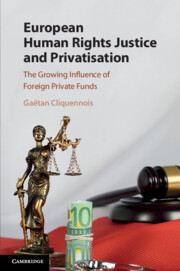Book contents
- European Human Rights Justice and Privatisation
- European Human Rights Justice and Privatisation
- Copyright page
- Contents
- Tables
- Foreword
- Acknowledgments
- Introduction
- Part I The Procedural Aspect of the Growing Influence of Private Foundations on the European Human Rights Justice System
- Part II The Substantive Dimension of the Growing Influence of Private Foundations on European Human Rights Justice
- Conclusion: Towards a Privatised Capture of Human Rights?
- Select Bibliography
- Index of Authors
- General Index
Conclusion: Towards a Privatised Capture of Human Rights?
Published online by Cambridge University Press: 06 October 2020
- European Human Rights Justice and Privatisation
- European Human Rights Justice and Privatisation
- Copyright page
- Contents
- Tables
- Foreword
- Acknowledgments
- Introduction
- Part I The Procedural Aspect of the Growing Influence of Private Foundations on the European Human Rights Justice System
- Part II The Substantive Dimension of the Growing Influence of Private Foundations on European Human Rights Justice
- Conclusion: Towards a Privatised Capture of Human Rights?
- Select Bibliography
- Index of Authors
- General Index
Summary
Through repeated litigation and advocacy, private foundations and some NGOs funded by them are influencing not only the actual content of each individual decision of the ECtHR, but also the overall shape of the case law of the Strasbourg Court through inputs (applications brought before the ECtHR and evidence used by the Court) and outputs (active participation in the execution of ECtHR judgments). While some US socio-legal scholars have assumed that NGOs are captured by their private funders (Vincent 2019) in their litigation efforts before the US Supreme Court, we have demonstrated that private foundations (in particular the OSF) do not only finance some litigating NGOs but also take cases to the European Courts directly. In doing so, they partly capture the Courts’ jurisprudence by orienting them towards highly political cases (territories and political topics) and the defence of the rights of certain minorities (such as Muslims, Roma, migrants, LGTB persons, prisoners, terrorists, human rights activists and political opponents supported by some private foundations), especially in Eastern countries and in Russia. In particular, repeated litigation plus public policy advocacy by NGOs specialising in litigation before the ECtHR and the CJEU shape the way in which the conflicts underlying cases are selected, discussed and resolved.
- Type
- Chapter
- Information
- European Human Rights Justice and PrivatisationThe Growing Influence of Foreign Private Funds, pp. 260 - 263Publisher: Cambridge University PressPrint publication year: 2020



